|
|
|
Sort Order |
|
|
|
Items / Page
|
|
|
|
|
|
|
| Srl | Item |
| 1 |
ID:
121126


|
|
|
|
|
| Publication |
2012.
|
| Summary/Abstract |
This article documents that precolonial state development was an impediment to the development of democracy outside Europe, because indigenous state institutions constrained the European colonial endeavor and limited the diffusion of European institutions and ideas. Some countries were strong enough to resist colonization; others had enough state infrastructure that the colonizers would rule through existing institutions. Neither group therefore experienced institutional transplantation or European settlement. Less developed states, in contrast, were easier to colonize and were often colonized with institutional transplantation and an influx of settlers carrying ideals of parliamentarism. Using OLS and IV estimation, I present statistical evidence of an autocratic legacy of early statehood and document the proposed causal channel for a large sample of non-European countries. The conclusion is robust to different samples, different democracy indices, an array of exogenous controls, and several alternative theories of the causes and correlates of democracy.
|
|
|
|
|
|
|
|
|
|
|
|
|
|
|
|
| 2 |
ID:
121136
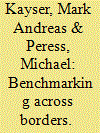

|
|
|
|
|
| Publication |
2012.
|
| Summary/Abstract |
When the economy in a single country contracts, voters often punish the government. When many economies contract, voters turn against their governments much less frequently. This suggests that the international context matters for the domestic vote, yet most research on electoral accountability assumes that voters treat their national economies as autarkic. We decompose two key economic aggregates-growth in real gross domestic product and unemployment-into their international and domestic components and demonstrate that voters hold incumbents more electorally accountable for the domestic than for the international component of growth. Voters in a wide variety of democracies benchmark national economic growth against that abroad, punishing (rewarding) incumbents for national outcomes that underperform (outperform) an international comparison. Tests suggest that this effect arises not from highly informed voters making direct comparisons but from "pre-benchmarking" by the media when reporting on the economy. The effect of benchmarked growth exceeds that of aggregate national growth by up to a factor of two and outstrips the international component of growth by an even larger margin, implying that previous research may have underestimated the strength of the economy on the vote.
|
|
|
|
|
|
|
|
|
|
|
|
|
|
|
|
| 3 |
ID:
121130
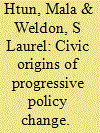

|
|
|
|
|
| Publication |
2012.
|
| Summary/Abstract |
Over the past four decades, violence against women (VAW) has come to be seen as a violation of human rights and an important concern for social policy. Yet government action remains uneven. Some countries have adopted comprehensive policies to combat VAW, whereas others have been slow to address the problem. Using an original dataset of social movements and VAW policies in 70 countries over four decades, we show that feminist mobilization in civil society-not intra-legislative political phenomena such as leftist parties or women in government or economic factors like national wealth-accounts for variation in policy development. In addition, we demonstrate that autonomous movements produce an enduring impact on VAW policy through the institutionalization of feminist ideas in international norms. This study brings national and global civil society into large-n explanations of social policy, arguing that analysis of civil society in general-and of social movements in particular-is critical to understanding progressive social policy change.
|
|
|
|
|
|
|
|
|
|
|
|
|
|
|
|
| 4 |
ID:
121132
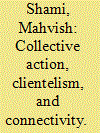

|
|
|
|
|
| Publication |
2012.
|
| Summary/Abstract |
Backed by studies finding only limited propensity for free-riding when communities have an interest in self-provision, the last few decades have seen a surge of interest in community-based development. A major caveat to the "second wave" of collective action studies, however, is that collective action often breaks down under hierarchical social relationships. This is unfortunate news for developing countries' rural societies, which are often entrenched in patron-client networks. Using a natural experiment found in the construction of a motorway, the article finds that clientelist relationships do not, in and by themselves, block peasant collective action. Rather, it is the interaction between clientelism and isolation that empowers patrons to block community-based projects. Peasants in connected villages face no such constraints, but instead rely on their patrons' assistance in collective projects, making the hierarchical network an additional resource.
|
|
|
|
|
|
|
|
|
|
|
|
|
|
|
|
| 5 |
ID:
121133
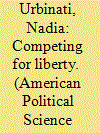

|
|
|
|
|
| Publication |
2012.
|
| Summary/Abstract |
Freedom as non-domination has acquired a leading status in political science. As a consequence of its success, neo-roman republicanism also has achieved great prominence as the political tradition that delivered it. Yet despite the fact that liberty in the Roman mode was forged not only in direct confrontation with monarchy but against democracy as well, the relationship of republicanism to democracy is the great absentee in the contemporary debate on non-domination. This article brings that relationship back into view in both historical and conceptual terms. It illustrates the misrepresentations of democracy in the Roman tradition and shows how these undergirded the theory of liberty as non-domination as a counter to political equality as a claim to taking part in imperium. In so doing it brings to the fore the "liberty side" of democratic citizenship as the equal rights of all citizens to exercise their political rights, in direct or indirect form.
|
|
|
|
|
|
|
|
|
|
|
|
|
|
|
|
| 6 |
ID:
121131


|
|
|
|
|
| Publication |
2012.
|
| Summary/Abstract |
Crime victimization is an important cause of political participation. Analysis of survey data from five continents shows that individuals who report recent crime victimization participate in politics more than comparable nonvictims. Rather than becoming withdrawn or disempowered, crime victims tend to become more engaged in civic and political life. The effect of crime victimization is roughly equivalent to an additional five to ten years of education, meaning that crime victimization ranks among the most influential predictors of political participation. Prior research has shown that exposure to violence during some civil wars can result in increased political participation, but this article demonstrates that the effect of victimization extends to peacetime, to nonviolent as well as violent crimes, and across most of the world. At the same time, however, crime victimization is sometimes associated with dissatisfaction with democracy and support for authoritarianism, vigilantism, and harsh policing tactics, especially in Latin America.
|
|
|
|
|
|
|
|
|
|
|
|
|
|
|
|
| 7 |
ID:
121129
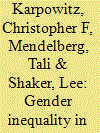

|
|
|
|
|
| Publication |
2012.
|
| Summary/Abstract |
Can men and women have equal levels of voice and authority in deliberation or does deliberation exacerbate gender inequality? Does increasing women's descriptive representation in deliberation increase their voice and authority? We answer these questions and move beyond the debate by hypothesizing that the group's gender composition interacts with its decision rule to exacerbate or erase the inequalities. We test this hypothesis and various alternatives, using experimental data with many groups and links between individuals' attitudes and speech. We find a substantial gender gap in voice and authority, but as hypothesized, it disappears under unanimous rule and few women, or under majority rule and many women. Deliberative design can avoid inequality by fitting institutional procedure to the social context of the situation.
|
|
|
|
|
|
|
|
|
|
|
|
|
|
|
|
| 8 |
ID:
121127
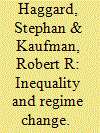

|
|
|
|
|
| Publication |
2012.
|
| Summary/Abstract |
Recent work by Carles Boix and Daron Acemoglu and James Robinson has focused on the role of inequality and distributive conflict in transitions to and from democratic rule. We assess these claims through causal process observation, using an original qualitative dataset on democratic transitions and reversions during the "third wave" from 1980 to 2000. We show that distributive conflict, a key causal mechanism in these theories, is present in just over half of all transition cases. Against theoretical expectations, a substantial number of these transitions occur in countries with high levels of inequality. Less than a third of all reversions are driven by distributive conflicts between elites and masses. We suggest a variety of alternative causal pathways to both transitions and reversions.
|
|
|
|
|
|
|
|
|
|
|
|
|
|
|
|
| 9 |
ID:
121128


|
|
|
|
|
| Publication |
2012.
|
| Summary/Abstract |
Why do people vote against their interests? Previous explanations miss something fundamental because they do not consider the work of group consciousness. Based on participant observation of conversations from May 2007 to May 2011 among 37 regularly occurring groups in 27 communities sampled across Wisconsin, this study shows that in some places, people have a class- and place-based identity that is intertwined with a perception of deprivation. The rural consciousness revealed here shows people attributing rural deprivation to the decision making of (urban) political elites, who disregard and disrespect rural residents and rural lifestyles. Thus these rural residents favor limited government, even though such a stance might seem contradictory to their economic self-interests. The results encourage us to consider the role of group consciousness-based perspectives rather than pitting interests against values as explanations for preferences. Also, the study suggests that public opinion research more seriously include listening to the public.
|
|
|
|
|
|
|
|
|
|
|
|
|
|
|
|
| 10 |
ID:
121134


|
|
|
|
|
| Publication |
2012.
|
| Summary/Abstract |
Principal-agent relations are replete in politics; politicians are agents of electorates, bureaucrats are agents of executives, lower courts are agents of upper courts, and much more. Commonly, principals are modeled as the rule-making body and agents as the rule-implementing body. However, principals often delegate the authority to make the rules themselves to their agents. The relationship between the lower federal courts and the Supreme Court is one such example; a considerable portion of the law (rules) is made in the lower federal courts with the Supreme Court serving primarily as the overseer of those lower courts' decisions. In this article, we develop and test a principal-agent model of law (rule) creation in a judicial hierarchy. The model yields new insights about the relationship among various features of the judicial hierarchy that run against many existing perceptions. For example, we find a non-monotonic relationship between the divergence in upper and lower court preferences over rules and the likelihood of review and reversal by the Supreme Court. The empirical evidence supports these derived relationships. Wider implications for the principal-agent literature are also discussed.
|
|
|
|
|
|
|
|
|
|
|
|
|
|
|
|
| 11 |
ID:
121135
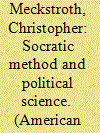

|
|
|
|
|
| Publication |
2012.
|
| Summary/Abstract |
This article advances a novel theoretical account of what a "method" is and what makes one "rigorous," and shows how it could advance contemporary debates in political theory and empirical methodology. Plato's Socrates invented the notion of method, and his characteristic practice of immanent refutation through questioning escapes key problems in more familiar views. Socratic method is (1) antifoundational, (2) non-algorithmic, and (3) indirect and relative to competing hypotheses, and it (4) develops its own standards of objectivity from the logic of asking questions. The article reconstructs Socrates' method from the Platonic texts and shows how it provides reasonable criteria for judgment while remaining critical, sensitive to difference, and open to innovation. Socratic method avoids a forced choice between universalism and particularism in political theory, and it provides a common language for evaluating both quantitative and qualitative methods by drawing out a critical logic of empirical inquiry shared by both.
|
|
|
|
|
|
|
|
|
|
|
|
|
|
|
|
|
|
|
|
|